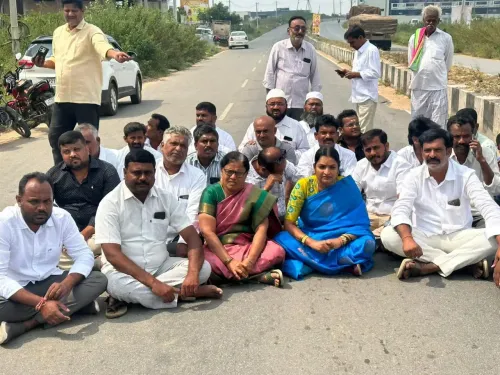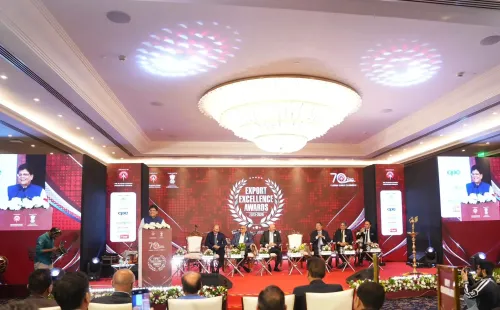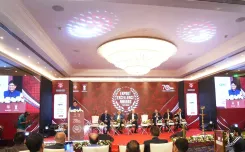Did MP Minister's Remarks on Raja Ram Mohan Roy Spark Controversy Between TMC and BJP?

Synopsis
Key Takeaways
- Controversial remarks by a Madhya Pradesh minister have sparked political tension.
- The TMC has accused the BJP of being anti-Bengali.
- Raja Ram Mohan Roy is a significant historical figure in Bengali culture.
- This incident may impact the upcoming state elections.
- The exchange reflects broader issues of cultural identity in India.
Kolkata, Nov 16 (NationPress) A recent controversial remark by a minister from Madhya Pradesh regarding Bengali social reformer Raja Ram Mohan Roy has ignited a significant conflict between the Trinamool Congress (TMC) and the BJP.
The party led by Mamata Banerjee quickly condemned the BJP as “anti-Bengali,” labeling its West Bengal leaders as outsiders after the BJP's Madhya Pradesh Higher Education Minister Inder Singh Parmar referred to the 19th-century reformer as a "British agent."
While addressing an event in Agar Malwa to commemorate the 150th anniversary of Birsa Munda, Parmar alleged that the tribal leader sought to halt a cycle of religious conversion driven by certain deceptive social reformers under British influence.
"A harmful cycle was prevalent in Bengal and surrounding areas aimed at altering the faith of the populace through English education, with the British enlisting numerous Indians as fake social reformers. Raja Ram Mohan Roy was among those who acted as a British agent. If anyone dared to disrupt their cycle of religious conversion, it was Birsa Munda, who safeguarded the tribal community," Parmar stated.
Roy is widely regarded as the father of the modern Indian renaissance and is celebrated for his pivotal role in abolishing the Sati practice and advocating for women’s rights, including widow remarriage. He was also a founding member of the Brahmo Sabha in 1828, which later evolved into Brahmo Samaj.
Taking advantage of the situation, the TMC launched a fierce attack on the BJP for its perceived disrespect towards Bengali identity. The party reiterated its narrative surrounding Bengali culture, a storyline bolstered by incidents of migrant workers from Bengal allegedly facing harassment in BJP-ruled states, as the 2026 state Assembly elections approach.
While Bengal BJP leaders have not yet commented on the matter, the TMC has criticized the BJP for “disrespecting” Bengal's cultural heritage.
"Those whose ancestors once served the British are now insulting the revered social reformer Raja Ram Mohan Roy by labeling him a 'British agent' and a 'fake social reformer.' The comments by BJP's Madhya Pradesh Higher Education Minister Indra Singh Parmar reflect the deplorable mindset of the BJP," remarked TMC spokesperson Arup Chakraborty.
He continued, "This BJP is an extremely misogynistic party, thus insulting Raja Ram Mohan Roy, who stood against injustices towards women. They show a blatant disregard for Bengal's culture and intellectuals. The people will not stand for such insults towards Bengal's intellectuals. This anti-Bengal BJP will be completely uprooted."
The party also utilized its social media platforms to further condemn the BJP for its ongoing disrespect towards prominent Bengali cultural figures.
"Struggling to make a mark in Bengal, the @BJP4India has resorted to its most dishonorable tactics, slandering Bengal and its towering icons that have shaped our civilization. From Rabindranath Tagore to Swami Vivekananda to Ishwar Chandra Vidyasagar, no luminary has escaped the BJP’s incessant insults. Now, in a shocking act of ignorance and arrogance, Madhya Pradesh Higher Education Minister @Indersinghsjp labeled Raja Ram Mohan Roy a 'British agent' and a 'fake reformer,'" the party expressed in a post on X.
"This reveals the true nature of the BJP, a party that lacks respect for culture, intellect, or social reform because it thrives solely on hate, lies, and distortion. But Bengal is vigilant," it concluded.









